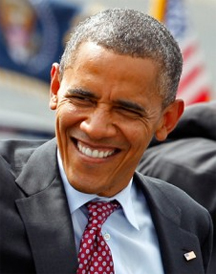CHARLOTTE, N.C., (Reuters) – President Barack Obama asked Americans on Thursday for patience in rebuilding the weak economy as he appealed for a new term in office and defiantly rejected Republican Mitt Romney’s proposals for growth as heartless.

Accepting the presidential nomination at the Democratic National Convention, Obama gave a more down-to-earth follow-up to his 2008 “hope and change” message. Weighed down by wars, high unemployment and political gridlock, he projected a tone that was more subdued, less exuberant.
Obama told Americans they face starkly different paths in choosing between him and Romney in the Nov. 6 election. He said his way may be hard but will bring economic renewal.
“America, I never said this journey would be easy, and I won’t promise that now,” he said. “Yes our path is harder – but it leads to a better place. Yes, our road is longer, but we travel it together.”
Locked in the political fight of his life with two months to go until the election, Obama faces the challenge of recapturing the magic of his historic campaign of four years ago and generating enthusiasm among voters who are weary of economic hardship. The convention was Obama’s best chance to appeal to the nation until the presidential debates start in October.
With tight stagecraft, the Democrats introduced speakers every night of the event in Charlotte to reach out to key parts of their base of support – promoting women’s issues, Obama’s auto bailout, Hispanic voters, gay rights and economic security for the middle class.
Obama’s nationally televised address was more of a steady-as-you-go message that outlined priorities like creating 1 million new manufacturing jobs but offered few details on how to achieve them. Early media reaction to the speech was not as glowing as it was for an address to the convention by former President Bill Clinton on Wednesday.
Obama argued that his economic measures, like the 2009 bailout of the auto industry, are working and asked Americans to rally around a set of goals: Expanding manufacturing and energy jobs and U.S. exports, improving education and trimming $4 trillion from America’s $16 trillion debt.
Repeatedly contrasting his own priorities with those he said were Romney’s, Obama cast the Republican as uncaring of middle-class Ameri-cans, pushing a theme that the former executive is elitist and only interested in helping those like him.
All Romney wants to do, said Obama, is reward the wealthy with tax cuts, deregulate banks and let energy companies write a policy for more oil drilling.
